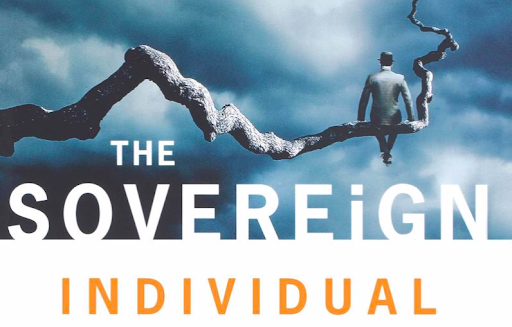Remember when we used to talk of a “post-covid world”? It’s funny to see how the expression quickly stopped being used as people realized the social order of the “new” world would be as nonsensical and wasteful as the previous.
Yet, the phrase had the merit to stress the role of the pandemic which brought so much stress on our social structures that it resulted in twenty years of “progress” packed into one. I think that today already if we’re attentive and careful, we can envision the next steps of our societal development.
 ◎ Triptych - Francis Bacon (1976)
◎ Triptych - Francis Bacon (1976)
The two post-covid worlds
I for one welcomed the “post-Covid” world with open arms, as it finally made apparent fundamental shifts that previously were hard to notice. It can be scary and worrisome, but it has one merit: the current situation is exerting too much pressure on the status quo for it to sustain itself — it will eventually normalize one way or another.
The most obvious end is the extrapolation of the current one: states becoming increasingly greedy in terms of surveillance and control, despite a lack of provable results coming from these strategies. As the situation worsens, they tend to tighten their grip even more to maintain a fleeting appearance of order. The reality is that the facts do not matter anymore — only the perception of them is accounted for.
This thesis has been documented since the middle of the past century.[1]. What’s left are citizens who have essentially less liberty than serfs from the Middle Ages, since they are oppressed by a remote and inaccessible technostructure instead of a lord you can visit and plead to.
On the other end is the sovereign individual, as described by James Dale Davidson and William Rees-Mogg more than twenty years ago.[2]. Such individuals understood the decreasing power and importance of states and developed a form of statelessness.
 ◎ The Sovereign Individual - James Dale Davidson et William Rees-Mogg (1997)
◎ The Sovereign Individual - James Dale Davidson et William Rees-Mogg (1997)
They treat nation-states like mere service providers (health care, education, justice, etc.) and put them in competition with one another. While they are still citizens of one or several countries, they are not tied to them and can move at the moment’s notice.
The reality will allow for a weird but unavoidable cohabitation of the two trends. That’s the gist of the thesis I want to explore today.
This issue is not political. Blue, red, who cares? We’re talking about a topic of higher significance than who gets to star the political muppet show of your country.
Nation-States sliding into irrelevance
This thesis is built upon a previous one: the progressive erosion of power and influence of nation states. It won’t happen overnight, it’s more of an iterative proccess, just like how our previous power structures fadded into irrelevance, such as the Church: they are still around, but their influence is order of magnitude lower than it used to be a couple of centuries ago.
Several concomitant phenomena are leading nation-states to obsolescence[3]:
- First the most obvious: states are running dry! Indeed, the power of states is directly indexed on their wealth. Yet most states are increasingly unable to properly collect the taxes they are due — which are their main source of sustenance.
- States are unable to have coherent analysis, draw long-term plans, and follow through on them, and I think the occurrence of Covid dissipated the few doubts left amongst the skeptics. The reasons here are various including short mandates, our political life turning into a low-tier reality TV, or the place lobbying took.
- States’ justice is a mockery, as some wealthy citizens are outside its reach while those with less status suffer its abuses (police brutality, systemic racism, etc.). Think about whistleblowers if you have any doubt on this: modern states preserve themselves at the expense of anything else, including the life and basic human rights of their citizens.
- There is no accountability nor check and balances for our modern states: the growth loop of the structure is now broken — which is why I am convinced of their upcoming demise.
- Finally and most importantly, states were unable to understand, compute and adapt to the digital reality — it requires a form of horizontal thinking that cannot cohabit with their top-down power distribution. We saw the dire consequences of this with the development of the Internet, and we’re witnessing it once again with decentralized ledger technologies (~blockchains).
Technofeudalism fills the void
Citizens no longer have root access to the system that rules them, their administrative privilege has been revoked.
The void left by the states is filled by a more chaotic and insidious structure sometimes referred to as “technofeudalism”[4]. One of the merits of the states was their relative transparency: you have a government made of public people, supposedly in charge and responsible. The head is identified and (supposedly) held accountable.
What grew in its absence is on the other hand a headless structure. It’s made of a myriad of corporations, sometimes promoting shared interests — such as reduced taxation or more lax working laws — but also frequently at odds with one another about specific topics. It’s essentially a disparate group unable to align on anything but an ever more methodical exploitation of the human race.
Simply put, our governments got “hacked”: they have been captured by private interests. Thanks to lobbying, the citizen’s administrative privileges have been removed — they no longer have root access to the system.
The “will of the people” or “public opinion” does not matter anymore as it became a mere metric to monitor with no real weight in the game. It’s kept at a certain threshold to preserver the illusion of democracy. Sometimes, the threshold is reached and protests arise.
What’s critical is what happens after: when citizens finally dare to ask for anything of significance, in the best cases, they get swamped by conventional thinking or in the worst case face brutal police repression, just like lords would send their footmen to silence a riot without a care about the demands.
The citizen and the serf
To find comparisons that can shed light on the status of today’s average citizen, one has to go far back in time to the serfs of the Middle Ages. Indeed we find several shared features:
- Absolute lack of autonomy, as both depend on a third party (state or corporation) for basic sustenance.
- Cannot determine oneself: while it’s obvious for serfs, it’s as powerful but much more insidious for modern-day citizens.
- Low to no influence over the power structures: a serf can plead to his lord — on the other hand, think about what does a citizen need to do nowadays to simply be heard (and ignored)? The grinding despair of our contemporary world led some of our peers to immolate themselves to shine a light on their cause — think about the level of anguish one must reach to walk this path[5].
However, the modern iteration of feudalism has a potent brand new leg that made it possible: the “technostructure”. Modern-day serfs are living in an increasingly digital world. As soon as they venture into this realm they are in private property — they renounce ownership over their data and sovereignty over their assets (your Facebook pictures do not belong to you). Very few citizens are aware of this, even less are technical-savvy enough to resist it.
So, to summarize my perspective, here are the main fundamental changes that are taking place:
- The states are less and less meaningful and influential
- They are increasingly replaced by private entities
- This replacement actualizes a de-facto enslavement of the majority of the population, unable to self-determine.
- A minority — the sovereign individuals — can extract themselves from the influence of their states, thanks to their wealth, technological savviness or other expertises.
How to become more sovereign?
So, how to withdraw oneself from the influence of states and private corporations?
I believe that the real battle is now being waged around the question of who will become sovereign. At the time the book was written, sovereignty was mainly acquired by playing with the world of the past. The situation has changed now: there are now more paths to “self-sovereignty”.
Indeed, the emergence of decentralized finance (DeFi) has completely changed the situation: it is a parallel financial universe built on a radically different set of pragmatic values: transparency, resistance to censorship, composability and open-source. Thus, decentralized finance is in a way the first “digital realm” accessible without giving up ownership of its goods or data.
While the values of our political system are promises that must be actively kept, DeFi’s values are applied at the code level: they are the result of the normal functioning of the system and cannot be violated.
DeFi thus allows individuals to possess and exchange goods without the need for an intermediary - it was a form of missing piece to the safeguarding of sovereignty. Thanks to DeFi, everyone can access elite financial services that are more resilient than those of the conventional world, made possible by a mix of private companies and legal frameworks.
If you’ve never heard of it before, you’ve come to the right place! This introduction will help you get started, and you’ll find many articles discussing DeFi on this blog.
 ◎ Leonardo Da Vinci - Flying Wing
◎ Leonardo Da Vinci - Flying Wing
Thanks for reading this piece until the end. If you liked it, you can:
- check the rest of my work published on this blog
- follow me on Twitter or using the RSS feed.
Licensing & References
This content lives under an open-source license (more information). You can translate or republish it, as long as it’s shared under the same terms and include attribution to this article.
Find below more additional resources to research further the key thesis and ideas mentioned in this piece:
Guy Debord cornered and analyses the concept — he called it the “Society of the Spectacle”
The two authors define and explore the thesis in their book The Sovereign Individual: Mastering the Transition to the Information Age, first published in 1997.
I wrote more extensively about this thesis about two years ago: The Demise of Nation States: Introducing the Nation as a Service (NaaS) & The Nation as a Service and its fractional citizenship- a good idea?
It’s essentially the concept referring to the modern servitude created by service platforms like Uber or Deliveroo & the increasing incorporation of algorithms in our daily life without control or understanding over them. Learn more here: Meet Your New Overlords: How Digital Platforms Develop and Sustain Technofeudalism
Here’s one of such story, in French but similar scenario unfolded in various countries.